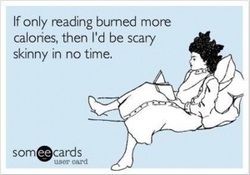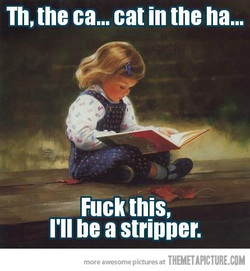|
Dylan English A minuscule freshman walks into his first year composition class - books in hand. He has no idea why he had to purchase four different books for this class, but it's his first semester of college so he bought all his books prior to the first day of class. The books vary. There's a book about MLA. There's a book about grammar and writing. There's a textbook with various readings throughout it's lengthy pages. Calm and collective, the student sits down in a seat that is not too close and not too far away from the professor. The professor hands out the syllabus and it states that only the textbook will be required to read. The, now broke, student doesn't make a peep, but he realizes that he is broke and could have used the money. Welcome to the first year writing course. Some students may feel overwhelmed when reading their first year writing course syllabus for the first time. Some may even feel like David in this video:  As I came across the thread that read "how much reading is too much reading for a FYC course," I instantly thought of our current senior seminar class. Most of our seminar class focuses on the writing part of the FYC course and why it is important (so far), and I found that this thread would be interesting to choose because of the reading aspect that also is part of the FYC course. As a declared English major, I walked into my FYC course interested in the topic. I love reading and writing; this class was going to be a breeze - and it was. However, that is a personal story of no relevance to the majority that are required to take FYC courses their freshman year. Most students in my class had no interest in reading and/or writing. This was going to be one of those courses they took just to fill a void in their degree audit. However, they had to read and write to pass the course. Was the reading assigned appropriate for the students taking this class?  The thread began with the initial concern that a professor was giving too much reading to his students. Throughout the conversation I noticed two things 1) that most professors agree that 15-50 pages a week is a good amount of reading for the course and 2) the people who participate in this thread have too much to say and don't stick to the main question. As an English major, 15-50 pages assigned a week is like a walk in the park (even though I don't like walking in the park, but you get my gist). For students that don't have strong reading skills, the required reading is a balanced amount - some may struggle, some may not. The overall goal though should not focus on the amount of reading assigned, but the student's understanding and writing about the reading. Does a student's writing show understanding of the reading? Are students able to successfully find themes and write about them? Reading and writing are like peanut butter and jelly. If you get rid of jelly, the peanut butter isn't complimented; if you get rid of the peanut butter, the jelly isn't complimented. A man named Jerry Nelms wrote a lengthy explanation to this question that I found quite intriguing and important: "Back to the original question, has anyone mentioned that while the number of pages is an issue, more significant may be the level of difficulty. What we're really talking about here, of course, is Vygotsky's "zone of proximal development," defined pretty much as the difference between what a student can do with support (scaffolding) and what she can do without support, the idea being that we should aim assignments (including reading) at that zone between where the student perceives the task is too easy and where the student perceives the task is too difficult, that zone where the assignment is a challenge but where the student perceives she can accomplish it. As someone said, different students, different zones of proximal development, different perceptions of difficulty, different levels of self-efficacy (confidence in being able to accomplish the task)." I find that Nelms provides an accurate account of what professors will find in a FYC course. There is no right answer to the question about too much reading. A professor must get to know his students. The professor must find out their students' weaknesses and strengths before they can determine how much reading is too much reading. Most teaching is a process of trial-and-error. If a professor is giving too much reading, they will be able to tell by the lack of connections that their students are making between their reading and writing in the course. To answer the initial question: There is no definite answer.
1 Comment
LT
2/18/2014 07:11:01 pm
I found this thread interesting because I think a lot about how first year students read. I think a lot about how students read, period. Part of it is about accountability. I've noticed in recent years that students tend not to do the reading if there is not something that has to be done with it that they turn in--I know I'm not the only one who notices this in the faculty. Students tend not to do the reading unless their is a specific test or a writing or something that they will be graded on. If you just ask them to read for, say, class discussion, a lot of students won't read. So that's part of it. But over the years I've certainly also noticed that I am a good writer because I was a good reader (a point the list made), and that if I wanted to have that be the case for my students I needed to, in a way, teach reading (another point on the list). So I do. I spend a lot of time trying to help students visualize what is going on in an essay so they can think about all the moves the author makes to write it. I think it helps. I mean, I don't know, but I think it helps. I've done a lot with book clubs--in all of my classes. You are the victims of reading journals, of course (but they really do help). But the biggest thing I do is this thing that involves a lot of paper and students moving around, but I don't have space to write about it here.
Reply
Leave a Reply. |

Blog493This blog is a reactionary overview of the daily posts to the Writing Program Administrator's listserv. One day; one blogger; lots of reactions. Archives
May 2014
Categories |
 RSS Feed
RSS Feed